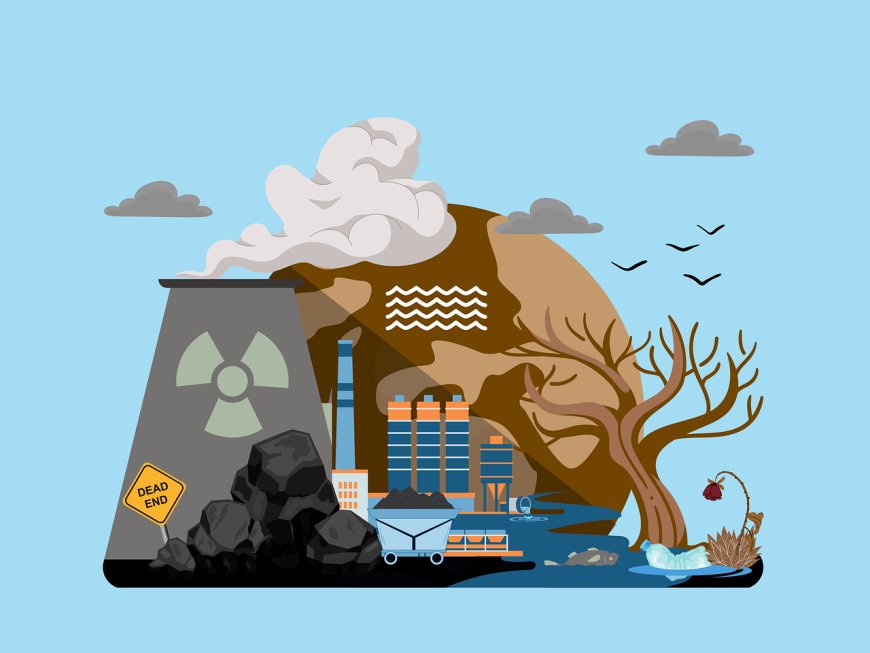“The Planet Is on Fire, and So Are Our Minds”: Climate Anxiety’s Grip on Gen Z
Climate anxiety is rising among Gen Z as they confront the reality of environmental collapse. Learn what it is, how it affects youth, and how they’re responding.

Introduction
Climate change is no longer a distant threat; it’s a lived experience, unfolding in real-time. From record-breaking heatwaves to floods and wildfires, the effects are not just environmental—they're deeply emotional. For Generation Z, a group born between the mid-1990s and early 2010s, this reality has sparked a growing mental health concern: climate change anxiety.
Often called eco-anxiety, this form of psychological distress stems from fear of environmental catastrophe and a sense of helplessness in the face of inaction. Unlike previous generations, Gen Z is coming of age during a climate crisis that feels both urgent and unsolvable. The result? An emotional burden that is affecting their well-being, identity, and future outlook.
What Is Climate Change Anxiety?
According to the American Psychological Association (APA), climate change anxiety is defined as “a chronic fear of environmental doom.” It’s not a clinical diagnosis but a legitimate emotional response to real and perceived threats from climate disruption.
This anxiety is characterized by:
-
Persistent worry about the future of the planet
-
Feelings of grief, guilt, or hopelessness
-
Sleep disturbances and intrusive thoughts
-
Difficulty concentrating or enjoying daily life
-
Overwhelming pressure to “fix” or reverse climate change
A 2021 global survey published in The Lancet found that 59% of young people felt very or extremely worried about climate change. Over 45% said their anxiety affected their daily life and ability to function.
Why Gen Z Is Uniquely Affected
1. Lifelong Exposure to Climate Messaging
Gen Z has grown up alongside headlines about rising sea levels, plastic-filled oceans, and vanishing wildlife. Unlike previous generations, their formative years were saturated with discussions of ecological doom, making climate change part of their emotional and developmental narrative.
2. Social Media Amplification
While social media empowers Gen Z to organize climate protests and share educational content, it also serves as a double-edged sword. Algorithms prioritize alarming headlines and visuals, contributing to doomscrolling and emotional fatigue.
Studies from Pew Research Center indicate that teens who frequently encounter distressing news online are at a higher risk of anxiety and depression, particularly when the issues feel unsolvable.
3. Intergenerational Tension and Powerlessness
Gen Z often feels betrayed by older generations and governments who failed to act sooner. This perceived inaction fuels resentment, grief, and a heavy sense of responsibility. As most Gen Zers are still not in positions of power, the disconnect between concern and capability deepens their psychological strain.
The Psychological Toll: Beyond Anxiety
While anxiety is the most visible symptom, climate-related distress in Gen Z can also manifest as:
-
Solastalgia: A term coined by philosopher Glenn Albrecht, referring to the distress caused by environmental change close to one’s home.
-
Moral Injury: The guilt or distress from participating in systems (like consumerism or air travel) that contribute to ecological harm.
-
Pre-traumatic stress disorder: A term used by therapists to describe anticipatory trauma caused by fear of future climate disasters.
Psychologists are now calling for the inclusion of climate-informed therapy in mental health care, especially for youth. Initiatives like Climate Psychology Alliance provide resources and a global network of professionals addressing this growing field.
How Gen Z Is Coping—and Leading
Despite the emotional toll, Gen Z is not surrendering to despair. Many are transforming their anxiety into activism, community engagement, and personal resilience.
1. Eco-Activism
Movements like Fridays for Future, launched by Greta Thunberg, have mobilized millions of youth globally. Gen Z-led climate organizations like Zero Hour and Sunrise Movement advocate for policy changes, education reform, and climate justice.
2. Therapy and Climate-Conscious Mental Health
There’s a growing demand for therapists who understand climate-related grief and anxiety. Platforms like Good Grief Network and ClimateAwarenessTherapy.org offer support groups and climate-aware counseling models.
3. Sustainable Lifestyle Choices
From choosing eco-friendly careers to adopting zero-waste habits and plant-based diets, Gen Z is aligning their lifestyles with their values, turning anxiety into action.
How Families, Schools, and Governments Can Help
Normalize Conversations About Eco-Anxiety
Talking openly about climate fear can reduce feelings of isolation. Families should encourage discussions without judgment and validate emotional responses.
Integrate Climate Education with Empowerment
Schools must move beyond doom-focused content. Teaching climate science should go hand-in-hand with solutions-based learning, empowering students to feel capable rather than paralyzed.
Policy and Mental Health Infrastructure
Governments need to address eco-anxiety not just through climate policy but also by expanding mental health access. The UK’s Royal College of Psychiatrists recently called on policymakers to recognize climate anxiety as a public health issue.
Final Thoughts
Climate anxiety is not a flaw in Gen Z—it’s a symptom of an incredibly empathetic, informed, and engaged generation facing an unprecedented global challenge. While the emotional burden is real, so is the potential for transformation.
The more we recognize climate anxiety as a legitimate concern, the better we can support Gen Z in turning their fear into resilience, their despair into action, and their grief into meaningful change.
This isn’t just about saving the planet—it’s about protecting the mental health of the very people who will inherit it.
What's Your Reaction?
 Like
0
Like
0
 Dislike
0
Dislike
0
 Love
0
Love
0
 Funny
0
Funny
0
 Angry
0
Angry
0
 Sad
0
Sad
0
 Wow
0
Wow
0



















































